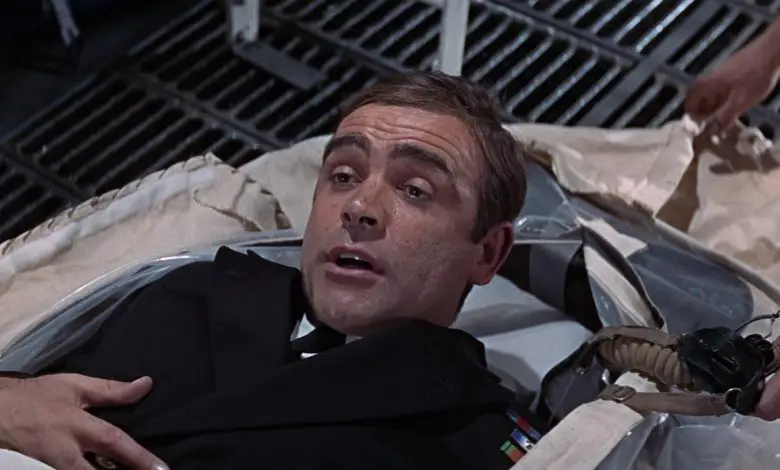
The phrase “You Only Live Twice” has a rich history that spans centuries and cultures. From its origins in 17th-century Japanese poetry to its modern-day significance in popular culture, this phrase has inspired countless interpretations and sparked profound discussions about life, death, and transformation. This article delves into the origins, interpretations, and impact of “You Only Live Twice,” exploring its significance in literature, film, philosophy, psychology, and popular culture.

The journey begins with Matsuo Basho, a renowned Japanese poet whose words inspired British author Ian Fleming. Fleming, in turn, used the phrase as the title of his 12th James Bond novel, which was later adapted into a successful film. The article then delves into the various interpretations of “You Only Live Twice,” examining its significance in philosophy, psychology, and popular culture. Finally, it provides resources for further exploration, inviting readers to delve deeper into this fascinating topic.
“You Only Live Twice”: A Profound Concept
“You Only Live Twice” is a phrase that has transcended time and cultures, originating from the 17th-century Japanese poet Matsuo Basho and later inspiring British author Ian Fleming in his 12th novel. This concept, which suggests that we live twice – once at birth and once when we confront death – has been explored in various forms of art and literature, from ancient poetry to modern cinema.
The Origins: Matsuo Basho’s Poetry
Matsuo Basho, a renowned haiku master, is often credited with the phrase “You only live twice: once when you’re born, and once when you look death in the face.” His poetry, characterized by its simplicity and depth, often explores themes of life, death, and the transient nature of existence. Basho’s works have had a profound influence on literature and philosophy, both within Japan and beyond.

The Literary Legacy: Ian Fleming’s Novels
Ian Fleming, the creator of the iconic James Bond character, was deeply inspired by Basho’s words. He used the phrase “You Only Live Twice” as the title of his 12th James Bond novel. In the novel, Bond himself writes a haiku for his friend Tiger Tanaka, further emphasizing Fleming’s appreciation for Basho’s poetry.
The Cinematic Adaptation: The James Bond Franchise
The phrase “You Only Live Twice” gained further popularity when Fleming’s novel was adapted into a film in 1967. By this time, the James Bond franchise had become a lucrative enterprise, with the film’s budget reaching an unprecedented $9.5 million – nearly the combined budgets of the first four films.

The Impact and Interpretations of “You Only Live Twice”
The phrase “You Only Live Twice” has been interpreted in various ways across different cultures and eras. Some view it as a commentary on the fleeting nature of life, while others see it as a call to live fully and fearlessly. Regardless of interpretation, the phrase continues to resonate with audiences worldwide.
In Literature and Film
In both Fleming’s novel and the subsequent film adaptation, “You Only Live Twice” serves as a thematic underpinning. It encapsulates the daring and often dangerous life of James Bond, a character who regularly confronts death.
In Philosophy and Psychology
From a philosophical and psychological perspective, “You Only Live Twice” can be seen as a reflection on mortality and the human condition. It suggests that true understanding and appreciation of life can only be achieved when one confronts the reality of death.
Further Reading and Resources
For those interested in delving deeper into the origins and impact of “You Only Live Twice,” the following resources are recommended:
The phrase “You Only Live Twice” serves as a poignant reminder of life’s transience and the importance of living fully. From Matsuo Basho’s poetry to Ian Fleming’s novels and the James Bond films, this concept continues to inspire and provoke thought, demonstrating the power of words to transcend time and culture.
Shop For Matsuo Basho’s Works
Frequently Asked Questions
1. Who was Matsuo Basho?
Matsuo Basho was a famous Japanese poet from the Edo period, known for his contributions to the development of Haiku, a form of Japanese poetry. Born in 1644, Basho elevated the haiku to a highly refined and respected art form. His works are celebrated for their simplicity, depth, and the profound understanding of human nature and the world around us.
Basho’s poetry often drew inspiration from his travels across Japan. His most famous work, “The Narrow Road to the Deep North,” is a collection of travel sketches and haiku that reflect his journey through the northern provinces of Japan. Basho’s influence on Japanese literature and poetry is immeasurable, and his works continue to be studied and admired to this day.
2. What is the significance of the phrase “You Only Live Twice” in Ian Fleming’s novel?
In Ian Fleming’s novel, “You Only Live Twice,” the phrase serves as a thematic underpinning, reflecting the dangerous and thrilling life of the protagonist, James Bond. The phrase is a nod to the constant danger and near-death experiences that Bond encounters in his line of work as a spy.
Moreover, the phrase also encapsulates the transformation and rebirth that Bond experiences in the novel. After suffering a personal loss, Bond is sent on a mission to Japan, where he confronts his grief and ultimately finds a new purpose. Thus, the phrase “You Only Live Twice” symbolizes both the physical danger and the emotional journey that Bond undergoes in the story.
3. How did the film “You Only Live Twice” contribute to the James Bond franchise?
The film “You Only Live Twice” marked a significant milestone in the James Bond franchise. Released in 1967, it was the fifth film in the series and the first to have a budget that nearly equaled the combined budgets of the first four films. This allowed for more elaborate sets, special effects, and action sequences, setting a new standard for future Bond films.
The film also introduced several elements that would become staples in the franchise, such as the use of exotic locations and the inclusion of high-tech gadgets. Furthermore, it was the first Bond film to fully delve into the character’s emotional journey, adding depth to the action-packed narrative.
4. How has the phrase “You Only Live Twice” been interpreted in philosophy and psychology?
In philosophy and psychology, the phrase “You Only Live Twice” is often interpreted as a reflection on mortality and the human condition. The first “life” represents our physical existence, while the second “life” symbolizes the profound understanding and appreciation of life that comes from confronting the reality of death.
This concept aligns with existentialist philosophy, which emphasizes the individual’s unique experience within a hostile or indifferent universe. It also resonates with various psychological theories, such as Carl Jung’s concept of individuation, which involves a process of self-realization and transformation.
5. How has the phrase “You Only Live Twice” permeated popular culture?
The phrase “You Only Live Twice” has had a significant impact on popular culture, appearing in various forms of media and entertainment. It has been referenced in songs, such as the title track for the James Bond film performed by Nancy Sinatra, and in television shows like “Mad Men,” where it was used to signify a character’s transformation.
The phrase has also been used in other films and books, often to underscore themes of mortality, rebirth, or transformation. Its enduring popularity attests to its universal appeal and its ability to encapsulate complex human experiences in a simple yet profound way.
6. How does the concept of “You Only Live Twice” relate to the character of James Bond?
The concept of “You Only Live Twice” is deeply intertwined with the character of James Bond. As a spy, Bond regularly faces life-threatening situations, embodying the idea of “living twice” through his constant confrontations with death.
Moreover, Bond’s character often undergoes significant transformations throughout the series, both physically and emotionally. These transformations can be seen as a form of “second life,” further reinforcing the concept of “You Only Live Twice.”
7. What is the significance of the haiku written by Bond in the novel “You Only Live Twice”?
In the novel “You Only Live Twice,” Bond writes a haiku for his friend Tiger Tanaka. This haiku, which incorporates the phrase “You Only Live Twice,” serves as a tribute to Basho’s poetry and reflects Bond’s appreciation for Japanese culture.
The haiku also encapsulates the themes of the novel, reflecting Bond’s personal journey and his confrontations with death. It serves as a poignant reminder of the transient nature of life and the importance of living fully.
8. How did Ian Fleming’s interest in Japanese culture influence his writing?
Ian Fleming’s interest in Japanese culture had a significant influence on his writing, particularly in the novel “You Only Live Twice.” Fleming was fascinated by Japanese history, literature, and philosophy, and he incorporated these elements into his novel.
The influence of Japanese culture is evident in the setting of the novel, the character of Tiger Tanaka, and the use of haiku. Fleming’s appreciation for Japanese culture adds depth and authenticity to the novel, enriching the narrative and providing a unique backdrop for Bond’s adventures.
9. How does the concept of “You Only Live Twice” resonate with modern audiences?
The concept of “You Only Live Twice” continues to resonate with modern audiences due to its universal themes of life, death, and transformation. In an era marked by rapid change and uncertainty, the idea of living fully and confronting death resonates deeply.
The phrase also appeals to the modern fascination with reinvention and personal growth. It suggests that we have the capacity to transform and live fully, regardless of the challenges we face.
10. How has the phrase “You Only Live Twice” influenced other works of literature and film?
The phrase “You Only Live Twice” has influenced numerous works of literature and film. Its themes of mortality, rebirth, and transformation have inspired authors and filmmakers, who have incorporated these concepts into their narratives.
For example, the phrase has been used in titles of books and films, and its themes have been explored in various genres, from science fiction to drama. The enduring influence of “You Only Live Twice” attests to its universal appeal and its ability to encapsulate complex human experiences in a simple yet profound way.
What is meant by You Only Live Twice?
In the story, Bond comes across the following quote: “Life offers two distinct experiences. The first is when you are born, and the second is when you confront mortality directly.” This turned out to be more contemplative than I initially expected. It implies that an individual can truly reflect on their life on only two occasions: when they come into the world and when they confront a genuine threat of death.
Conclusion
The phrase “You Only Live Twice” serves as a poignant reminder of life’s transience and the importance of living fully. Its origins in Matsuo Basho’s poetry and its influence on Ian Fleming’s novels and the James Bond films demonstrate the power of words to transcend time and culture. Whether viewed as a reflection on mortality or a call to live fearlessly, “You Only Live Twice” continues to resonate with audiences worldwide.
As we continue to explore and interpret this phrase, we are reminded of the profound impact that words can have on our understanding of life and death. From literature and film to philosophy and psychology, “You Only Live Twice” invites us to reflect on our own lives and confront the reality of our mortality. It is a testament to the enduring power of language and the timeless appeal of exploring the human condition.











One Comment